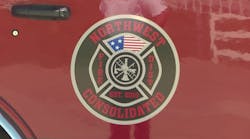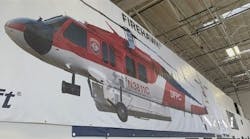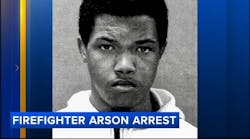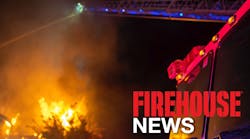The wheels start coming off the wagon for most candidates in the tactical simulation right about the time they start assigning the second alarm units. Losing equipment is one of the areas in which promotional candidates get into trouble. You can overcome this by using a piece of paper with a line drawn down the center. When you order equipment, put the responding units on the right hand side of the line. When you assign the equipment, move it to the left side of the line. It's not uncommon at the end of the drill for the raters to ask you where certain units are assigned. Using this simple formula, you always know where the units are assigned.
Staging
Staging is another area where you can lose equipment. Although you should ID where staging will be located, so you can get credit with the raters, don't use it! It can create a dog-and-pony show. You have assignments that need to be accomplished. Before you start assigning those second-alarm units, get an updated report of conditions from fire attack. I'll bet the fire is going to be getting bigger, requiring more resources. But, before you start placing those resources, call for a third or greater alarm, because you are going to need them. They will probably be responding from a greater distance or from mutual aid.
Then, catch those units while they're responding in, and give them their assignments. I find most candidates don't think big enough here. Stay ahead of the curve. Order more than enough equipment early. It's fantasyland. You can order anything you desire. You won't be criticized for it. You will certainly be buried if you don't!
Fire Problem
We assisted Jarrett on his entry-level pursuit of his first badge. Now, he was going for his first promotional test. Like most candidates I coach, he was buried around the second/third alarm when he ran out of resources. I saw the light come on when it happened. I knew it would never happen to Jarrett again.
On game day, Jarrett was given 15 minutes to review a two-page document of his fire problem before going into the simulator. Part of the instructions was that the dispatcher would notify the IC before responding units arrived on the scene. As Jarrett entered the room for the fire-problem exercise for a three-story apartment fire, the moderator was already playing the role of dispatcher, barking out orders. Jarrett kept his cool. He went on scene and gave a size-up, took command, stated where the command post was located, ordered a second-alarm assignment from dispatch, and, most importantly, turned to the raters and told them that his plan was to confine the fire to the apartment of origin. Understand that if you go right to tactics without having a plan, it's assumed you didn't have one; and you have lost the fire. This seemed to irritate the dispatcher. Jarrett assigned his personnel to the next arriving unit he assigned to fire attack.
Even though Jarrett had been instructed not to depend on dispatch, but start to give assignments to incoming units in his coaching session, he was waiting for dispatch to let him know before they went on the scene. Finally Jarrett asked dispatch when the units would be on scene. To his surprise, the dispatcher came back with news that all units were on scene. It was catch-up time. Jarrett took a big swallow and went right to assigning units to water supply, ventilation, RIT, utilities, rescue, etc. During this time, the dispatcher was still barking out orders. Jarrett gave this command: "Dispatch hold your traffic!" This was Jarrett's fire, not dispatch's, right?
As with most simulations, they want to see how long you can tread water. Often, they will eventually make the fire larger than you can handle. Fire lapped from the second floor unit to a third floor apartment. Jarrett seemed to handle everything they could throw at him.
The lesson here is this: no matter what you might have been instructed, it is your fire. It's your command. Run it the way you had planned.
Later, Jarrett reviewed his evaluation of the fire problem with the personnel analyst who was in the room during the fire problem. She told Jarrett that when he left the room, the raters told her to hire him now. Jarrett got the top score of 19 of the possible 20 points in this exercise. The analyst mentioned, "Well, you've been here before." Jarrett said, "No, this is my first promotional test." She said, "That's not possible for your first time out. How did you do it?" Jarrett told her, "I studied hard and got some coaching."
Yes, he did. The defense rests!
Jarrett ended up No. 2 on the list his first time out. We dialed him up a little more before the chief's interview, and he jumped to No. 1! He had the badge within 30 days. You got to love it.
This from Jarrett:
Captain Bob,
It's funny your e-mail came today, this morning at a mutual aid drill. I was approached by a BC from another Dept. He was a rater on my assessment center fire simulation. He congratulated me on my new position and stated that my simulation was one of the best he had ever seen. He stressed ever, and he is not a young guy. He continued with how imprested he was with my "command presence." Thank you again for the great coaching. By the way, the job has exceeded every expectation and more. My driver has been a medic in the department for 22 years, and my tailboard is about to make permanent status. I have a great crew.
Thanks,
Captain Jarrett Anderson
Remember, absolutely nothing counts 'til you have the badge. Nothing!
Fire "Captain Bob" Author of Becoming A Firefighter, Conquer Fire Department Oral Boards, and
It's Your Turn in the Hot Seat! www.eatstress.com





